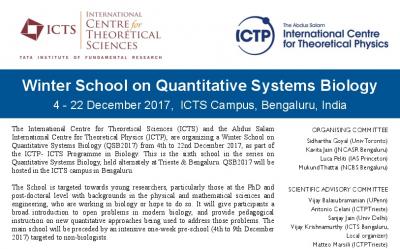The International Centre for Theoretical Sciences (ICTS) and the Abdus Salam International Centre for Theoretical Physics (ICTP), are organizing a Winter School on Quantitative Systems Biology (QSB2017) from 4th to 22nd December 2017, as part of the ICTP - ICTS Programme in Biology. This is the sixth school in the series on Quantitative Systems Biology, held alternately at Trieste & Bengaluru. QSB2017 will be hosted in the ICTS campus in Bengaluru.
The School is targeted towards young researchers, particularly those at the PhD and post-doctoral level with backgrounds in the physical and mathematical sciences and engineering, who are working in biology or hope to do so. It will give participants a broad introduction to open problems in modern biology, and provide pedagogical instruction on new quantitative approaches being used to address those problems. The main school will be preceded by an intensive one-week pre-school (4th to 9th December 2017) targeted to non-biologists.
QSB2017 is focused on biological evolution. Evolutionary processes shape diversity at all levels of biological organization, ranging from networks of interacting molecules in a cell to species and the community level. In the recent years, new methods and approaches have allowed to gain insight on evolutionary processes in real time, either via long-term evolution experiments or by high-resolution lineage tracking. New unexpected phenomena have been discovered, like the CRISPR bacterial immune system, while lineage-tracking has been used to understand evolutionary processes in the organisms, such as stem cell fates. This is a setting that is fertile for quantitative work, both theoretical and experimental. The courses will provide an intensive background to the specific topics before turning towards cutting-edge research.
Topics include
- Bacterial and viral evolution: Viral evolution (HIV and flu), Evolution strategies in bacteria, Microbial ecology and game theory
- Evolution at the organism level: Protein folding and evolution, Clonal analysis via barcodes, Stem-cell fate and clonal analysis, Immunology and clonal analysis, Genome evolution, Evolutionary developmental biology (evo-devo), Genetic and developmental basis of evolutionary change.
- Mechanisms and strategies of evolution: Adaptation as a stochastic process, Evolution of variability, Evolution of mutation rates, Evolution of biological networks, Evolution without natural selection, Learning as an evolutionary process.
Scientists and students from all over the world can apply for the School. Researchers from developing countries are particularly encouraged to apply. As the program will be conducted in English, participants should have an adequate working knowledge of this language. The subsistence expenses of all selected outstation participants will be borne by the School. As a rule, travel expenses of the participants should be borne by the home institution. Every effort should be made by the candidates to secure support for their fare. However, limited funds are available for some participants. Selected participants are expected to attend the entire main school. Selection for the main school automatically guarantees selection for the pre-school, but attending the pre-school is not compulsory. There is no registration fee.
ORGANISING COMMITTEE
- Sidhartha Goyal (Univ Toronto)
- Kavita Jain (JNCASR Bengaluru)
- Luca Peliti (IAS Princeton)
- Mukund Thattai (NCBS Bengaluru)
SCIENTIFIC ADVISORY COMMITTEE
- Vijay Balasubramanian (UPenn)
- Antonio Celani (ICTP Trieste)
- Sanjay Jain (Univ Delhi)
- Vijay Krishnamurthy (ICTS Bengaluru, Local organizer)
- Matteo Marsili (ICTP Trieste)
LECTURERS INCLUDE
- Jamie Blundell (Stanford)
- Lucy Colwell (Cambridge)
- Paul Francois (McGill)
- Sergei Gavrilets (Tennessee)
- Jeff Gore (MIT)
- Michael Lynch (Indiana)
- Harmit Malik (Fred Hutch)
- Richard Neher (MPI Tubingen)
- Erik van Nimwegen (Basel)
- Paul Rainey (ESPCI Paris)
- John Reinitz (Chicago)
- Paul Sniegowski (UPenn)
Previous editions of this school
 icts
icts res
res in
in

